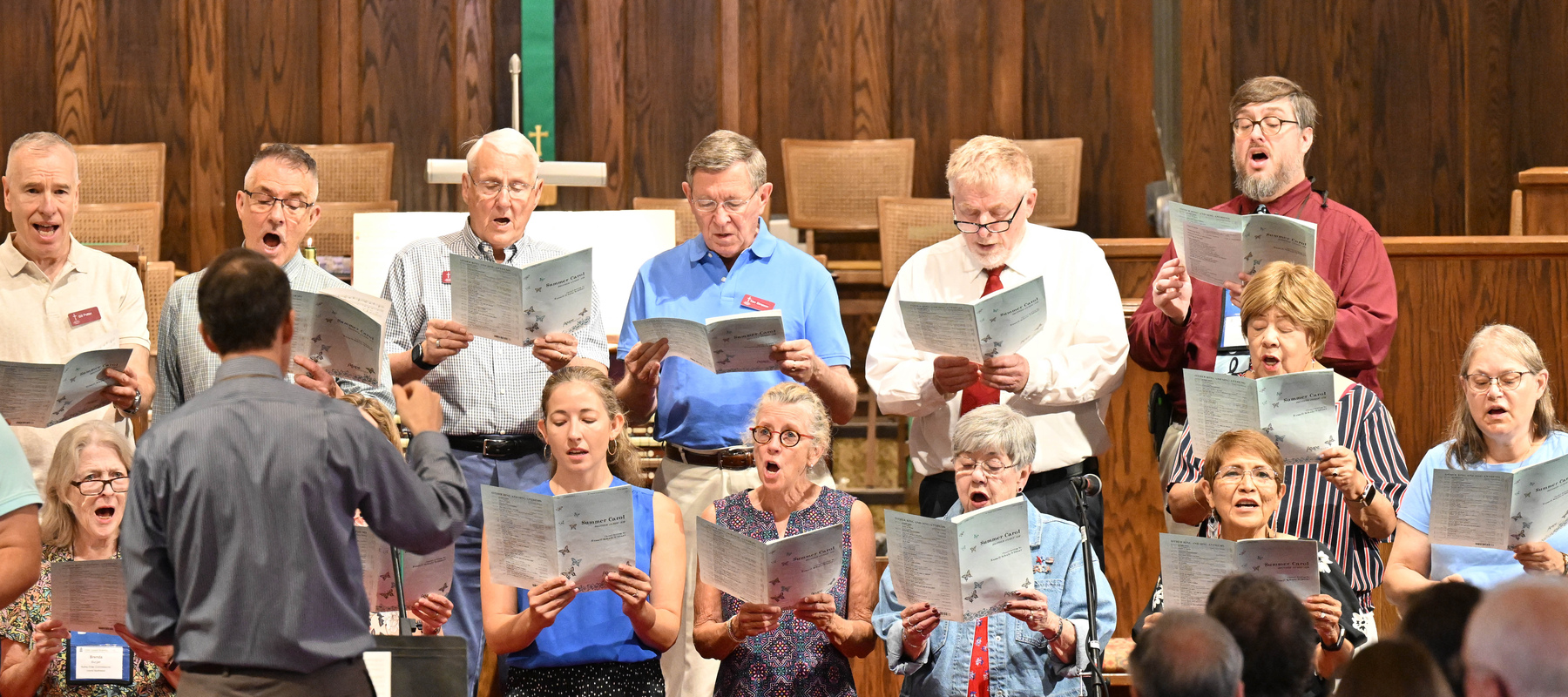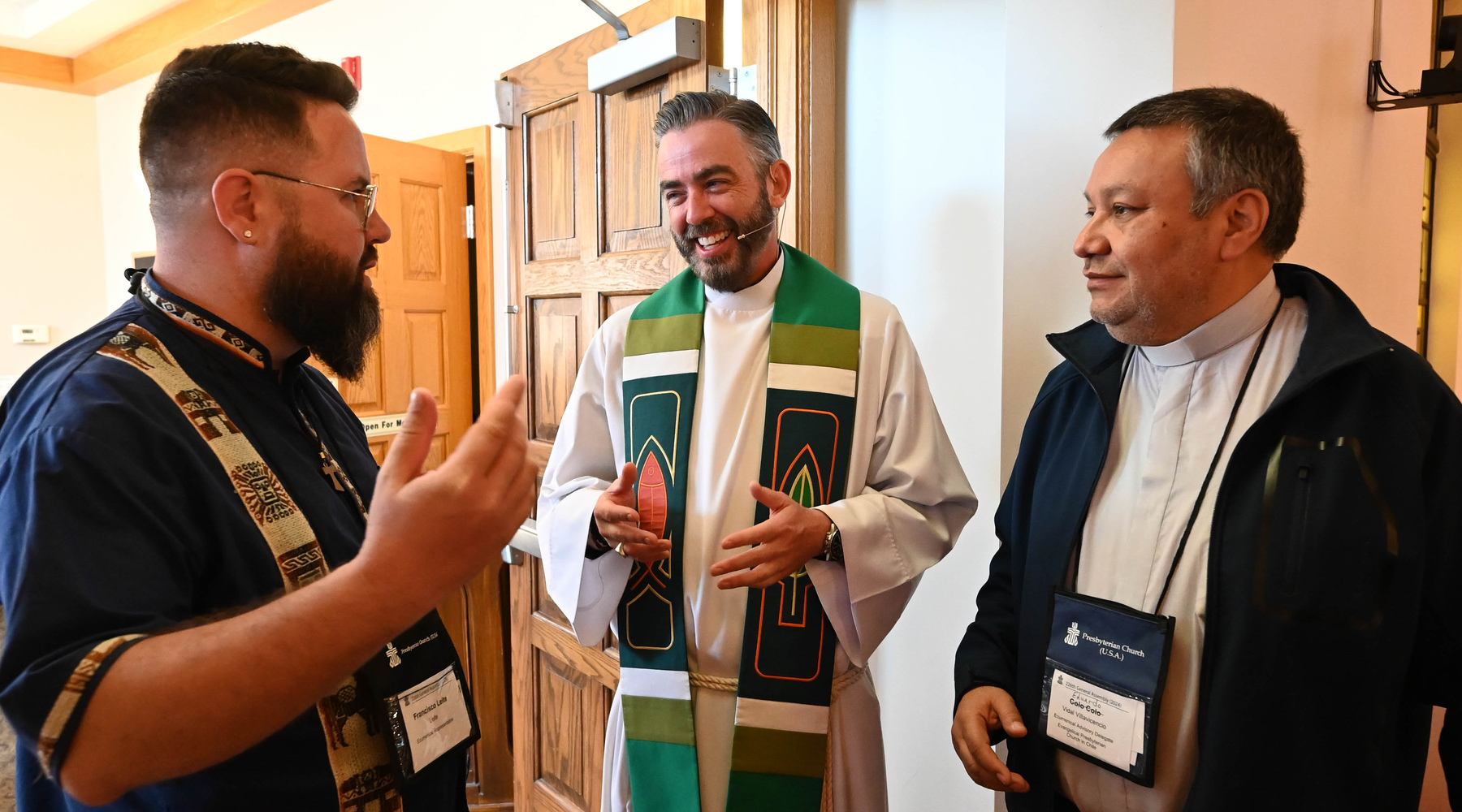
The Wasatch Presbyterian Church choir sings during morning worship. Photo by Rich Copley
On Sunday, Wasatch Presbyterian Church welcomed two busloads of Presbyterians from around the country to an inclusive and eclectic worship service. From the prelude to the postlude, the vibe of vitality through variety thrummed through the sanctuary with classical organ, favorite hymns, a praise band and a small but mighty bell choir. The children’s choir was apparently on vacation for the long holiday weekend, but the Boomer band was “rocking,” according to one commissioner.
“We are so excited to see all you visiting guests from General Assembly,” said the Rev. Andrew Fleishman, associate pastor of Wasatch Presbyterian Church. The church has called the Rev. Irene Pak Lee as its installed pastor. Pak Lee will begin her service in August.
“A lot of our families are off on vacation so having you fill up the sanctuary in this way is just glorious,” joked Fleishman, before inviting everyone to prepare for worship through the tolling of the bells. Joining in with the delightful chimes of praise, a young voice spoke unbidden through the silent intervals “ding-dong, ding-dong,” as if God had made their own heart with a brass clapper ready to sing.

Wasatch Presbyterian Church in Salt Lake City and the Rev. Andrew Fleishman welcomed attendees of GA226 to worship Sunday, June 30, 2024. Photo by Rich Copley

Wasatch Presbyterian Church in Salt Lake City and the Rev. Andrew Fleishman welcomed attendees of GA226 to worship Sunday, June 30, 2024. Photo by Rich Copley
Church leadership conveyed inclusivity throughout their communications. A week prior, the church administrator sent out an email to all who registered for bus transportation and a lunch hosted by the congregation to let guests know what to expect at the church and how to meet their needs from hearing assistance devices, sensor-safe earplugs, gender neutral bathrooms and private space for nursing mothers. Ushers of all ages from eight years old and up greeted people at the door. In his welcome, Fleishman acclimated worshipers to the space, reiterating what assistance was available for those with impairment or sensory needs and offering guidance on how to make space with the service dog joining in the worship.
“Strengthen us to include in our prayers and our fellowship, those who feel excluded,” stated the prayer of confession before explicitly naming “such things as their race, their religion, their sexuality, their gender, their age, their handicap —whatever it is that creates barriers between people.”
The Rev. Dr. Diane Moffett, president and executive director of the Presbyterian Mission Agency, delivered the ministry spotlight message. She marveled at the many ways the church’s values and outreach aligned with the denominational wide Matthew 25 Movement. Moffett invited all the gathered guests to join the 1,200 plus churches and over 50% of presbyteries that already seek to glorify God in living out a call to care for the vulnerable, dismantle structural oppression and seek the vitality of churches and their surrounding communities.
In a sermon based on Mark 5:21-43, Fleishman opened up the text of Jairus’s daughter from the perspective of the “desperate dad.” Fleishman proposed Jairus must have been this fearful father when he threw himself at the feet of a radical teacher with a reputation of healing outside the bounds. He teased out the ways that Jesus ignored the holiness codes to restore people who reached out to Jesus or to whom Jesus reached out in love. These interactions made Jesus “unclean” in the eyes of some. However, the actions of Jesus were also essential to the restoration of those cast out for their vulnerabilities.
“Jesus is not very orderly, but my Lord, he is decent,” said Fleishman. “He isn’t particularly religious either, fellow Presbyterians,” said Fleishman, “at least not when religion gets in the way of doing the right thing and pointing desperate people to hope.”
Fleishman spoke with authenticity of his own experience in fatherhood and in family ministry, shining a light on topics often treated as taboo on Sunday mornings — acute medical scares, autism, anxiety, depression, gender identity transitions, and conflict and divorce in the family system.
“We have to reach out like our lives depend on it,” concluded Fleishman. “And as we reach, know that the power of Jesus flows in our desperation and is transmuted right before our eyes into restoration.”
